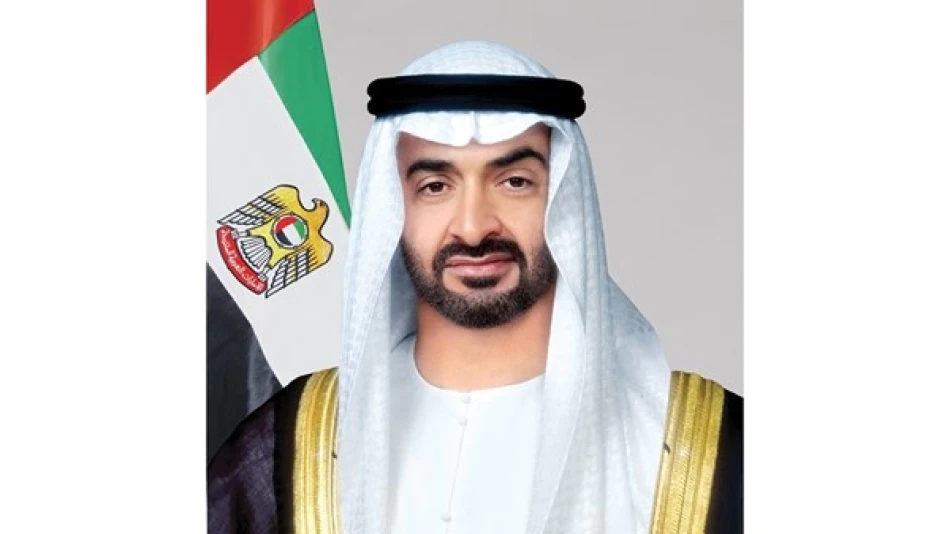
UAE President Issues Decree to Restructure Zayed Humanitarian Foundation's Board of Trustees, Chaired by Dheyab bin Mohammed bin Zayed
UAE Consolidates Humanitarian Leadership Under New Zayed Heritage Foundation Board
The UAE has restructured the board of trustees for the Zayed Humanitarian Heritage Foundation, signaling a strategic consolidation of the nation's extensive humanitarian and sustainability initiatives under unified leadership. The move positions the Emirates to leverage its growing influence in global philanthropy while streamlining oversight of major environmental and educational programs worth billions of dollars.
Strategic Leadership Reshuffle
President Sheikh Mohamed bin Zayed Al Nahyan issued Federal Decree No. 116 of 2025, appointing Sheikh Dhiyab bin Mohamed bin Zayed Al Nahyan as chairman of the foundation's board of trustees. The appointment consolidates significant authority under Sheikh Dhiyab, who already serves as Deputy Chairman of the Presidential Court for Development Affairs and Martyrs' Families, and Chairman of the International Humanitarian Affairs Council.
The eight-member board includes senior government officials spanning strategic affairs, community empowerment, and international aid coordination, reflecting the foundation's broad mandate across multiple sectors.
Umbrella for UAE's Global Humanitarian Empire
The Zayed Humanitarian Heritage Foundation, established in 2024, operates as a mega-structure overseeing some of the UAE's most prominent international initiatives. Its portfolio includes the Mohamed bin Zayed Species Conservation Fund, which has distributed over $230 million globally, and the Zayed Sustainability Prize, which has supported projects reaching 378 million people worldwide.
Diverse Portfolio Signals Soft Power Strategy
The foundation's oversight extends to educational awards, environmental conservation efforts, and healthcare initiatives including the Global Institute for Disease Elimination. This breadth mirrors similar consolidation strategies employed by other Gulf states, particularly Saudi Arabia's Vision 2030 initiative, as regional powers compete for influence in global development.
Market and Geopolitical Implications
The restructuring comes as the UAE intensifies its positioning as a hub for sustainable finance and ESG investments. The foundation's environmental and conservation arms provide credibility for Abu Dhabi's ambitions to attract green bonds and climate finance, sectors expected to reach $100 trillion globally by 2030.
For investors and development organizations, the consolidation suggests more streamlined decision-making and potentially larger-scale funding opportunities. The UAE's humanitarian spending has grown consistently, with international aid exceeding $7 billion annually in recent years.
Regional Competition in Humanitarian Leadership
This institutional strengthening reflects broader competition among Gulf states for humanitarian leadership. While Saudi Arabia focuses on mega-projects like NEOM's environmental initiatives, and Qatar emphasizes education through initiatives like Education Above All, the UAE's approach emphasizes diversified impact across conservation, technology, and traditional aid.
The timing aligns with the UAE's preparations for COP28 legacy projects and its ongoing efforts to position itself as a bridge between developed and developing nations on climate action.
Operational Efficiency Through Consolidation
By bringing multiple foundations and initiatives under one governance structure, the UAE addresses previous concerns about coordination overlap and resource allocation efficiency. The model resembles Singapore's approach to sovereign wealth management, where multiple entities operate under unified strategic direction while maintaining operational independence.
The restructuring positions the UAE's humanitarian sector for greater impact and influence, leveraging institutional efficiency to compete with larger economies in global development leadership.
Most Viewed News

 Layla Al Mansoori
Layla Al Mansoori






